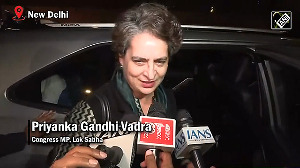A critical battle has been won for the telecommunications industry as the defence ministry has agreed to release 45 mega hertz of spectrum, the radio frequency on which mobile phone signals travel.
Out of this, 25 MHz is for 3G, or third generation of mobile services that enable high-speed data transfer, and the rest for 2G, the service prevalent in the country at present.
The defence ministry has signed a memorandum of understanding with the Ministry of Communications and Information Technology under which the armed forces will immediately release 10 MHz of 3G spectrum and 5 MHz of 2G spectrum.
The rest will be released according to timelines agreed on by the two ministries, which are contingent upon DoT placing the supply order for setting up an optic fibre cable network for the defence services, the supply of the equipment, its installation and commissioning.
A top executive of a telecom equipment company said the release of this spectrum by the defence ministry will solve the immediate problems of telecom service providers, many of which are plagued with network congestion.
To put things in perspective, Bharti Airtel, the largest mobile phone service provider, has about 9 MHz across the country, on which it services some 100 million subscribers.
The department of telecommunications, or DoT, is believed to have submitted a paper to the defence ministry last year that said the spread of 3G services had been held up because of insufficient spectrum.
A high-level committee of the two ministries will be constituted to monitor the timelines and cost.
The defence forces have always been major users of spectrum, a scarce natural resource. They use it for strategic security-related operations like air defence, command and control, information services, communication and early warning.
They have spectrum along the border, as well as in the hinterland and mainland, for low-intensity conflicts. The defence ministry's view has been that it could part with some spectrum by shifting the use of some systems to an exclusive fibre-based network.
At the meeting of the group of ministers on spectrum under the previous government, the defence ministry had said security needs made it imperative for the armed forces to have a dedicated and exclusive OFC network. Microwave mobile links of the army operated through the country and catered to public emergency services such as natural disasters, counter-insurgency operations, etc. Therefore, it was essential to set up an exclusive and dedicated OFC network for the defence services if they were to give up spectrum.






